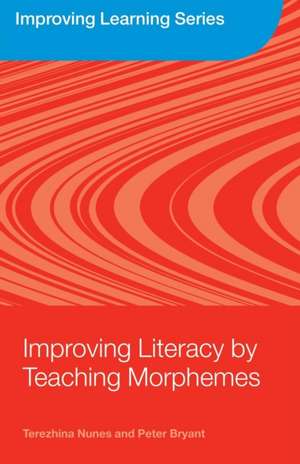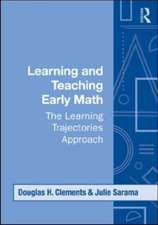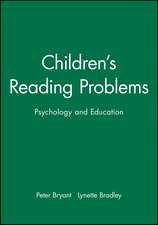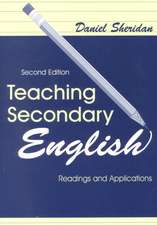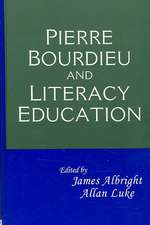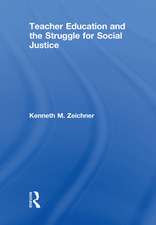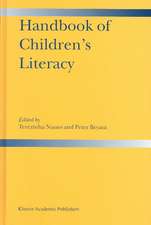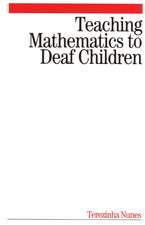Improving Literacy by Teaching Morphemes: Improving Learning
Autor Terezinha Nunes, Peter Bryanten Limba Engleză Paperback – 20 iul 2006
By breaking words down into chunks of meaning that can be analyzed as complete units rather than as strings of individual letters, children are better able to make sense of the often contradictory spelling and reading rules of English. As a result, their enjoyment of learning about words increases, and their literacy skills improve. Written by leading researchers for trainee teachers, practising teachers and interested parents, this highly accessible and innovative book provides sound, evidence-based advice and materials that can be used to help teach children about morphemes, and highlights the beneficial effects of this approach.
| Toate formatele și edițiile | Preț | Express |
|---|---|---|
| Paperback (1) | 436.02 lei 6-8 săpt. | |
| Taylor & Francis – 20 iul 2006 | 436.02 lei 6-8 săpt. | |
| Hardback (1) | 1107.34 lei 6-8 săpt. | |
| Taylor & Francis – 20 iul 2006 | 1107.34 lei 6-8 săpt. |
Din seria Improving Learning
- 15%
 Preț: 397.37 lei
Preț: 397.37 lei -
 Preț: 332.12 lei
Preț: 332.12 lei -
 Preț: 307.87 lei
Preț: 307.87 lei -
 Preț: 396.52 lei
Preț: 396.52 lei -
 Preț: 421.63 lei
Preț: 421.63 lei -
 Preț: 389.70 lei
Preț: 389.70 lei -
 Preț: 395.20 lei
Preț: 395.20 lei - 17%
 Preț: 287.78 lei
Preț: 287.78 lei -
 Preț: 396.91 lei
Preț: 396.91 lei -
 Preț: 381.72 lei
Preț: 381.72 lei - 17%
 Preț: 289.67 lei
Preț: 289.67 lei - 17%
 Preț: 239.32 lei
Preț: 239.32 lei -
 Preț: 410.60 lei
Preț: 410.60 lei -
 Preț: 383.83 lei
Preț: 383.83 lei -
 Preț: 382.31 lei
Preț: 382.31 lei -
 Preț: 381.72 lei
Preț: 381.72 lei - 18%
 Preț: 996.33 lei
Preț: 996.33 lei -
 Preț: 395.93 lei
Preț: 395.93 lei -
 Preț: 395.38 lei
Preț: 395.38 lei -
 Preț: 391.13 lei
Preț: 391.13 lei -
 Preț: 434.45 lei
Preț: 434.45 lei
Preț: 436.02 lei
Nou
Puncte Express: 654
Preț estimativ în valută:
83.44€ • 86.79$ • 68.89£
83.44€ • 86.79$ • 68.89£
Carte tipărită la comandă
Livrare economică 14-28 aprilie
Preluare comenzi: 021 569.72.76
Specificații
ISBN-13: 9780415383134
ISBN-10: 0415383137
Pagini: 224
Ilustrații: 11 tables
Dimensiuni: 138 x 216 x 12 mm
Greutate: 0.3 kg
Ediția:1
Editura: Taylor & Francis
Colecția Routledge
Seria Improving Learning
Locul publicării:Oxford, United Kingdom
ISBN-10: 0415383137
Pagini: 224
Ilustrații: 11 tables
Dimensiuni: 138 x 216 x 12 mm
Greutate: 0.3 kg
Ediția:1
Editura: Taylor & Francis
Colecția Routledge
Seria Improving Learning
Locul publicării:Oxford, United Kingdom
Public țintă
ProfessionalCuprins
Part 1: What is the Issue? 1. Morphemes and Literacy: A Starting Point 2. What Knowledge of Morphemes Do Children and Adults Show in the Way That They Spell Words Part 2: What Does the Research Tell Us? 3. From the Laboratory to the Classroom 4. An Interview Program for Teaching Children about Morphemes in the Classroom: Effects on Spelling 5. An Intervention Program for Classroom Teaching About Morphemes: Effects on the Children’s Vocabulary 6. Can We Increase Teacher’s Awareness of Morphology and Have an Impact on Their Pupils’ Spelling? Part 3: What are the Overall Implications? 7. Morphemes and Literacy: Context and Conclusions
Notă biografică
Terezinha Nunes is Professor of Educational Studies at the University of Oxford and Fellow of Harris-Manchester College, Oxford.
Peter Bryant is Visiting Professor of Psychology at Oxford Brookes University, UK and Emeritus Fellow of Wolfson College, Oxford.
Peter Bryant is Visiting Professor of Psychology at Oxford Brookes University, UK and Emeritus Fellow of Wolfson College, Oxford.
Recenzii
'Although primary teachers are the main target audience for this book, I think that teachers and trainers of adult literacy would also find it instructive in terms of broadening their understanding of how we learn to spell.' - Kerry Doyle, Northbrook College of Further and Higher Education
'The book is a challenge to advocates of predominantly phonetic approaches to spelling and to those who think good spelling is simply a matter of effective memorisation. Convincing research evidence is presented from a number of schools in London and Oxford suggesting that teaching morphemes will help to overcome some of the problems associated with the lack of spelling-sound correspondence in the English language.' - escalate.ac.uk
'The book is extremely well written with excellent illustrations and will be useful to a wide audience. Students of psychology and education will find a very clear exposition of morphemes and why they are important for spelling'. - British Journal of Educational Psychology
'Although primary teachers are the main target audience for this book, I think that teachers and trainers of adult literacy would also find it instructive in terms of broadening their understanding of how we learn to spell.' - Kerry Doyle, Northbrook College of Further and Higher Education
'The book is a challenge to advocates of predominantly phonetic approaches to spelling and to those who think good spelling is simply a matter of effective memorisation. Convincing research evidence is presented from a number of schools in London and Oxford suggesting that teaching morphemes will help to overcome some of the problems associated with the lack of spelling-sound correspondence in the English language.' - escalate.ac.uk
'The book presents challenging ideas and evidence pertinent to the raising of educational standards in reading, spelling, vocabulary extension and comprehension - and to the continuing professional development of teachers by acknowledging and valuing their professionalism.' - The Psychologist
'The book is a challenge to advocates of predominantly phonetic approaches to spelling and to those who think good spelling is simply a matter of effective memorisation. Convincing research evidence is presented from a number of schools in London and Oxford suggesting that teaching morphemes will help to overcome some of the problems associated with the lack of spelling-sound correspondence in the English language.' - escalate.ac.uk
'The book is extremely well written with excellent illustrations and will be useful to a wide audience. Students of psychology and education will find a very clear exposition of morphemes and why they are important for spelling'. - British Journal of Educational Psychology
'Although primary teachers are the main target audience for this book, I think that teachers and trainers of adult literacy would also find it instructive in terms of broadening their understanding of how we learn to spell.' - Kerry Doyle, Northbrook College of Further and Higher Education
'The book is a challenge to advocates of predominantly phonetic approaches to spelling and to those who think good spelling is simply a matter of effective memorisation. Convincing research evidence is presented from a number of schools in London and Oxford suggesting that teaching morphemes will help to overcome some of the problems associated with the lack of spelling-sound correspondence in the English language.' - escalate.ac.uk
'The book presents challenging ideas and evidence pertinent to the raising of educational standards in reading, spelling, vocabulary extension and comprehension - and to the continuing professional development of teachers by acknowledging and valuing their professionalism.' - The Psychologist
Descriere
Breaking words down into units of meaning can help children with spelling where other techniques such as phonics can fail. This book outlines techniques for teaching about these morphemes, and highlights the potential benefits for literacy learning.
